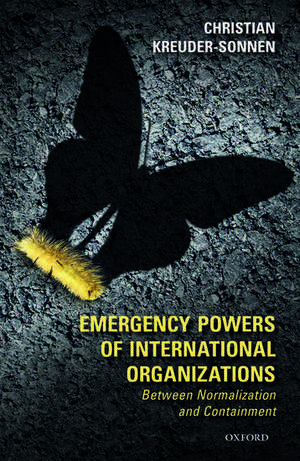Emergency Powers of International Organizations: Between Normalization and Containment
Autor Christian Kreuder-Sonnenen Limba Engleză Hardback – 21 noi 2019
Preț: 557.84 lei
Preț vechi: 740.08 lei
-25% Nou
Puncte Express: 837
Preț estimativ în valută:
106.78€ • 116.02$ • 89.75£
106.78€ • 116.02$ • 89.75£
Carte tipărită la comandă
Livrare economică 10-16 aprilie
Preluare comenzi: 021 569.72.76
Specificații
ISBN-13: 9780198832935
ISBN-10: 0198832931
Pagini: 268
Dimensiuni: 160 x 240 x 20 mm
Greutate: 0.54 kg
Editura: OUP OXFORD
Colecția OUP Oxford
Locul publicării:Oxford, United Kingdom
ISBN-10: 0198832931
Pagini: 268
Dimensiuni: 160 x 240 x 20 mm
Greutate: 0.54 kg
Editura: OUP OXFORD
Colecția OUP Oxford
Locul publicării:Oxford, United Kingdom
Recenzii
Emergency Powers of International Organizations makes an important contribution to understanding how and when IOs expand and retract the exceptional power they create in times of crisis. But Kreuder-Sonnen's most important contribution is to bring theoretical and empirical heft to the explanatory power of political rhetoric in international relations as well as the independent effect of IO legitimacy in global governance.
The authority of international institutions is bounded by laws and rules much like national governments are bounded by constitutions. And just like governments, international institutions often claim that extreme circumstances sometimes require going beyond those limits, and giving legal justification for what otherwise would be extra-legal action. This path-breaking book is the first to examine emergency powers of international organizations. At once practical, theoretical, and comparative, it opens a new branch of research in global governance by considering how political demands overwhelm legal constraints and become normalized in law. Pairing ratchet and rollback effects, Kreuder-Sonnen provides a strikingly original perspective on the law and politics of global governance. The book is sure to motivate a new generation of scholars on the dynamics between legalization and politics.
While the dangers of emergency powers have long been observed for national states at war, recent actions of international organizations have raised this worry to a new level. Examining the responses of the UN, the EU, and the WHO to recent crises, Christian Kreuder-Sonnen shows how emergency powers have either been normalized or have been subject to constitution-like checks, with implications for both international relations and domestic politics. This important book marks a new stage in the development of the theory and practice of global governance.
A very important book that offers original insights into the uses and abuses of emergency powers by international organizations, it is a must-read for anyone interested in the normative dilemmas of global governance, with illuminating cases studies to illustrate the 'ratchets' and 'rollbacks' involved in the rhetorical legitimation struggles of governors and the governed alike.
The authority of international institutions is bounded by laws and rules much like national governments are bounded by constitutions. And just like governments, international institutions often claim that extreme circumstances sometimes require going beyond those limits, and giving legal justification for what otherwise would be extra-legal action. This path-breaking book is the first to examine emergency powers of international organizations. At once practical, theoretical, and comparative, it opens a new branch of research in global governance by considering how political demands overwhelm legal constraints and become normalized in law. Pairing ratchet and rollback effects, Kreuder-Sonnen provides a strikingly original perspective on the law and politics of global governance. The book is sure to motivate a new generation of scholars on the dynamics between legalization and politics.
While the dangers of emergency powers have long been observed for national states at war, recent actions of international organizations have raised this worry to a new level. Examining the responses of the UN, the EU, and the WHO to recent crises, Christian Kreuder-Sonnen shows how emergency powers have either been normalized or have been subject to constitution-like checks, with implications for both international relations and domestic politics. This important book marks a new stage in the development of the theory and practice of global governance.
A very important book that offers original insights into the uses and abuses of emergency powers by international organizations, it is a must-read for anyone interested in the normative dilemmas of global governance, with illuminating cases studies to illustrate the 'ratchets' and 'rollbacks' involved in the rhetorical legitimation struggles of governors and the governed alike.
Notă biografică
Prof. Dr. Christian Kreuder-Sonnen is assistant professor of political science and international organizations at Friedrich Schiller University Jena and co-director of the MA program International Organizations and Crisis Management.
